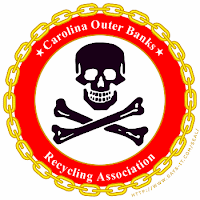How To Profit From The Most Lucrative Market In The History Of The World!
A Tale Of Two Resorts
Orlando, Florida and Carolina’s Outer Banks (OBX) are two areas on the east coast where people go to enjoy the weather, vacation, and be entertained.
Orlando, with a major airport, Walt Disney, Universal Studios, SeaWorld, Legoland, and the Magic playing at Amtrak Center, is an implementation of big companies. Most workers are corporate employees.
Legend has it that Nags Head was named for lights hung on mules' heads by “wreckers” who would lead ships to be shipwrecked near shore where the economically challenged could loot the ships of their valuables.
 |
| COBRA logo |
Home Depot came to OBX less than ten years ago, and competes with much older hardware and lumber recyclers providing construction materials.
At the Outer Banks, instead of hotels, most visitors rent houses. Chain franchises compete with local restaurants. There is little corporate overlay, most people work by themselves or in small crews.
Contractors performing maintenance on houses change every year, and we find competent help by asking neighbors.
The New Work Model
Please, somebody tell me what to do!
Guys saying that will be unemployed or in low reward employment.
It used to be that you did what your boss asked and the boss would get you paid. That hasn’t been true for 20 years.
Increasingly, staff jobs, and the “professions” of the ’60’s are being done by software. Figure that ten positions then is two positions now, and the repetitive, billable work is done online by the customer.
Clearly, we need a new understanding.
We know the job prospects for someone who can’t read.
What are the job prospects for someone who doesn’t know how to find and use the opportunities in the new economy?
How can you learn what you need to know?
Mary Meeker’s 2009 Web 2.0 Summit presentation, slides 31, 32, 62, shows how there were a million mainframes in the ’60’s, ten million minicomputers in the ’70’s, a hundred million PC’s in the ’90’s, a billion desktop/cellphone users in 2000, and predicting 10 billion mobile consumers in the next decade.
The New Opportunity
Ten billion addressable customers connected to you through your browser!
Those southern boys coming north to Detroit after WWII knew how to dirt farm. They had to learn how to build cars.
This isn’t about computers. The internet breaks down the old barriers of distance. But you have to design your offering for that market.
For the past 15 years, we have been learning this new model. Did you ever call 1-800-GOOGLE for support? There is no one there.
Consider the difference between the Microsoft (paid consultants encouraged) and the open source development paradigm (Proceed. You won't break the Internet).
Technology is how you do things. That is what is changing.
At Global StartUp Weekend, Washington DC had the third most startups of any city in the world. Were you involved?
New Organization
Last week, I figured out I was working with 15 people in 9 distinct ventures, some paid, some under development.
It’s not a management pyramid structure, it’s a hub and spoke system, some projects I am dominant, others I play a supporting role. The model is Open Source Leadership.
I was leading BlogLab, when we got into a conversation about monetizing blogs. I asked if there was an example of monetization without blogging? Got a good one. That video had advertising, went viral, and the person who posted the video said it paid for his kid's college education. The lesson, monetizing is not connected to blogging, monetizing is connected to monetizing.
One of the participants described it as lightning fortune. Reminded me of the sculpture in Sweet Home Alabama.
William Gibson wrote, “The future is already here, it’s just not evenly distributed.”
Descriptions abound when you know what you are looking for.
What action you are taking after reading this post?

